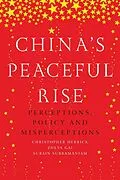Adopting a constructivist approach, this book argues that China's prospects for achieving 'great power' status peacefully depend more on perceptions of the country's development than on concrete measures of power or economic benefits. Incorporating historical perceptions, survey data and general analysis, the authors explore Chinese foreign policies in international organisations, international trade, security relations and as a model for global governance, as well as the reactions to those policies within the context of China's relations with Asian neighbours (India, Japan and the states of South-east Asia), existing international powers (the European Union, Russia and the United States), and emergent trading partners (Africa).
Autorentext
Christopher W. Herrick is Professor of Political Science and Director of the International Studies program at Muhlenberg College Zheya Gai is Professor of Political Science and Director of International Studies at Washington and Jefferson College Surain Subramaniam is Associate Professor of International and Asian Studies at University of North Carolina at Asheville
Klappentext
China's rise to great-power status is one of the most significant issues of the twenty-first century. Will the People's Republic be able to complete this process peacefully? And what are the security, economic and governance implications for the rest of the world?The majority of scholars approach these questions from one of two perspectives: competitive security and power (realism) or complementary economic self-interest (liberalism). In this book, Christopher Herrick, Zheya Gai and Surain Subramaniam offer a constructivist alternative, arguing that China's prospects for achieving great-power status peacefully depend more on domestic and international perceptions of the country's rise - perceptions rooted in such factors as historical experience and national image.Early chapters explore the Chinese mind-set and historical experience, as well as foreign attitudes to China and applicable international relations theory. The authors then proceed to look at three dimensions of Chinese policy - security, economics and governance - situating them within the context of China's relations with Asian neighbours (India, Japan and the states of Southeast Asia), existing international powers (the European Union, Russia and the United States) and emergent trading partners (Africa). At the heart of the book is an analysis of how increased economically beneficial trade with China affects historically based negative perceptions.Accessible enough for undergraduates but full of material that will challenge academics and policy-makers, China's peaceful rise is essential reading for those with interests in Chinese foreign policy, East Asia and international relations.
Inhalt
IntroductionPart I: Perspectives 1. Public and elite perceptions of China's rise2. The perspectives of International Relations theory3. The Chinese worldviewPart II: The Security Dimension4. China's relations with the United States5. China's relations with key European states6. Sino-Japanese relations7. China-Russia relations8. China-India relations9. China's relations with Southeast AsiaPart III: The Economic Dimension10. China in the global economy11. China - Africa relations12. China and emerging Asia13. China and the developmental statePart IV: Governance14. China in the UN Security Council15. China in the WTO16. China's ASEAN policy17. China and global democracyConclusionsIndex
Titel
China's peaceful rise
Untertitel
Perceptions, policy and misperceptions
EAN
9781526104809
Format
E-Book (epub)
Hersteller
Veröffentlichung
26.09.2016
Digitaler Kopierschutz
Adobe-DRM
Dateigrösse
3.85 MB
Anzahl Seiten
464
Unerwartete Verzögerung
Ups, ein Fehler ist aufgetreten. Bitte versuchen Sie es später noch einmal.
